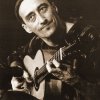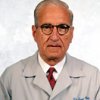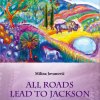He has performed and recorded in a wide variety of settings and musical styles, ranging from music of the Baroque and Classical periods to Blues, Jazz, and Rock.
Tadic's performing and recording credits include projects with Mark Nauseef, The Los Angeles Opera with Placido Domingo, Howard Levy, Joachim Kühn, L. Shankar, Markus Stockhausen, Dusan Bogdanovic, Vlatko Stefanovski, Teofilovic Brothers, Wadada Leo Smith, David Torn, Maria João, Jack Bruce, The Grande Mothers, Theodosii Spassov, Kudsi Erguner, Djivan Gasparyan, Pandit Swapan Chaudhuri and Ustad Ashish Khan, among others.
.Tadic has recorded worldwide and his music can be heard on CMP Records, M–A Recordings, Third Ear, Avalon, Croatia Records, ENJA, Nine Winds and Sony/BMG. He performs regularly in Europe, North and South America and Japan.
In recent years Tadic has concentrated on developing an approach to improvisation which combines and juxtaposes musical material drawn from many diverse sources, including Baroque, European classical and North Indian classical music, Flamenco, Eastern European folk traditions, Blues, Jazz, and Rock. He is noted for his pioneering work in applying the elements of classical and flamenco techniques to the electric guitar.
He has composed solo and chamber music which is published by Les Editions Doberman-Yppan. Tadic has written music for numerous experimental film, dance and theatre works and most recently completed music for Croatian feature film “Seventy Two Days” by Danilo Serbedzija.
Since 1985 he has been a professor at the prestigious California Institute of the Arts in Los Angeles.
For more thorough and detailed information on Miroslav Tadic, please check out these excellent interviews:
- http://www.innerviews.org/inner/tadic.html
- http://www.guitar-muse.com/interview-with-miroslav-tadic-4508
- http://www.guitar-muse.com/interview-with-miroslav-tadic-part-two-4655
Videos:
Solo
- http://www.youtube.com/watch?v=IjXhN3Y6wNI&feature=related
- http://www.youtube.com/watch?v=77wfhL-qA5Y&feature=related
With Vlatko Stefanovski
- http://www.youtube.com/watch?v=kyFwwIHw6nw&playnext=1&list=PLA9C768C27BC3B7E3
- http://www.youtube.com/watch?v=fa07c5Ovs6w
With Vlatko Stefanovski and Theodosii Spassov
With Vlatko Stefanovski, Theodosii Spassov and Swapan Chaudhuri
With Howard Levy
With Howard Levy and Mark Nauseef
http://www.youtube.com/watch?v=r6a8oTGX_cY&feature=related
With the Grande Mothers
With Rade Serbedzija





